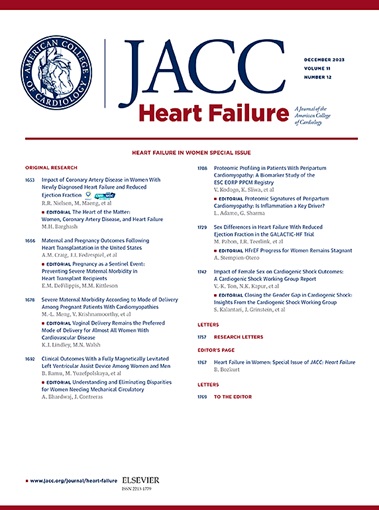Failure to Launch
IF 10.3
1区 医学
Q1 CARDIAC & CARDIOVASCULAR SYSTEMS
引用次数: 0
Abstract
There is a pressing need to translate evidence for heart failure (HF) therapies into contemporary practice. Medications that improve HF morbidity and mortality remain underused because of complex barriers at multiple levels across the health care ecosystem. High-quality implementation trials demonstrate that specific interventions can increase prescription, intensification, and persistence of HF medication. However, evidence-based interventions have not been widely implemented across health care organizations in the United States. This review explores 5 key strategies—patient activation, audit and feedback, rapid intensive initiation of medical therapy, virtual care teams, and clinical decision support tools—and discusses barriers to their widespread adoption. Although some barriers are specific to an intervention, others stem from systemic limitations among health care organizations and the health policy landscape. Using lessons learned from recent trials, this review also highlights future investigations needed to address these barriers, encourages uptake of successful implementation strategies, and discusses common approaches that should be abandoned.
发射失败
迫切需要将心力衰竭(HF)治疗的证据转化为当代实践。改善心衰发病率和死亡率的药物仍未得到充分利用,因为在整个卫生保健生态系统的多个层面存在复杂的障碍。高质量的实施试验表明,特定的干预措施可以增加心衰药物的处方、强化和持久性。然而,以证据为基础的干预措施尚未在美国的卫生保健组织中广泛实施。这篇综述探讨了5个关键策略——患者激活、审计和反馈、快速密集的药物治疗启动、虚拟护理团队和临床决策支持工具——并讨论了它们被广泛采用的障碍。虽然有些障碍是特定于某项干预措施的,但其他障碍源于卫生保健组织和卫生政策环境中的系统性限制。利用从最近的试验中吸取的经验教训,本综述还强调了解决这些障碍所需的未来调查,鼓励采用成功的实施战略,并讨论了应该放弃的常见方法。
本文章由计算机程序翻译,如有差异,请以英文原文为准。
求助全文
约1分钟内获得全文
求助全文
来源期刊

JACC. Heart failure
CARDIAC & CARDIOVASCULAR SYSTEMS-
CiteScore
21.20
自引率
2.30%
发文量
164
期刊介绍:
JACC: Heart Failure publishes crucial findings on the pathophysiology, diagnosis, treatment, and care of heart failure patients. The goal is to enhance understanding through timely scientific communication on disease, clinical trials, outcomes, and therapeutic advances. The Journal fosters interdisciplinary connections with neuroscience, pulmonary medicine, nephrology, electrophysiology, and surgery related to heart failure. It also covers articles on pharmacogenetics, biomarkers, and metabolomics.
 求助内容:
求助内容: 应助结果提醒方式:
应助结果提醒方式:


